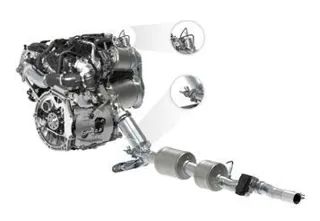The Irish government’s plans to introduce a tax based on a vehicle’s NOx emissions, has been welcomed by the AIR Alliance, publishers of the AIR Index.
The proposed NOx-based approach would replace the current one per cent diesel surcharge and is set to be applied to new car purchases and used imports from January 1, 2020.
Under the new tax, the first 60mg/km of NOx emissions from new cars will be charged at a rate of €5 per mg. For emissions above 60mg/km of NOx, the charge increases to €15 per mg, and above 81mg/km it jumps to €25 per mg. The NOx charge will be capped at a maximum of €4,850 for diesel vehicles and €600 for other vehicles.
NOx calculation
The Irish government has calculated these rates using an average NOx emissions from new cars of 43mg/km. This means for the majority of new diesel models, the charge is likely to directly replace the existing one per cent Vehicle Registration Tax (VRT) on diesel engine cars.
Although it welcomes the move, caution has also been urged by the AIR Alliance, which publishes the AIR Index. AIR (Allow Independent Road-testing) is an independent alliance of public and private organisations, which promotes the voluntary uptake of independent on-road emissions testing.
Cars and vans rated for the AIR Index are tested according to standardised (CWA 17379) methodology which “ensures that the results are independent, comparable and can be used as the basis for a legal framework for vehicle policies”.
Not reflective
Tests conducted for the AIR Index earlier this year revealed that the “homologated data, reflected in the certificate of conformity, does not reflect on-road emissions in urban driving”. As a result it says that a significant number of Euro 6 vehicles still emit significantly more NOx on the road than under laboratory conditions.
Massimo Fedeli, co-founder and operations director, AIR said: “We applaud the Irish Government for making the bold step to link a financial car tax charge to the milligrams of NOx emitted in light of public health and environmental concerns. Reducing NOx in urban areas is a core focus for the AIR Alliance, so this is a very positive move.
“However, as results of on-road NOx emissions tests conducted for the AIR Index reveal, there is a shocking variation in actual emissions compared with stated official results. We would be delighted to work with the Irish Government to make this tax as effective as possible, using our database of real-world emissions results, to distinguish the clean from the dirty cars enabling informed choices within this polluter-pays policy.”
Accurate information
Nick Molden, co-founder of AIR said: “This is a ground-breaking and positive step towards cleaning up air quality in our cities. However, it needs the most accurate information on real-world NOx emissions, which only the AIR Index provides.
“The choice of which NOx rating is used will be critical to the success or failure of the policy. Anything based purely on laboratory figures will significantly underestimate actual emissions, and therefore the tax would not reflect the level of emissions produced during on-road urban driving.
“Cleaning up air quality requires the application of a tax like this not just to the latest vehicles, which are much cleaner, but also to the older Euro 6 and earlier vehicles, which are the actual primary and significant source of nitrogen oxide emissions – which is why this new tax must be based on an independent, reliable and trusted source of real-world data for new and used cars.”
For information on car emissions, runing costs and clean air zones (CAZs), use our invaluable fleet tools.





















Login to comment
Comments
No comments have been made yet.